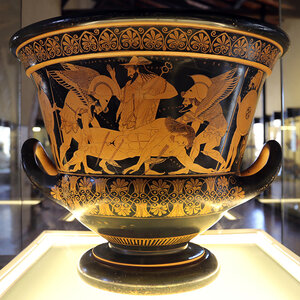Metropolitan Museum of Art to Return Vase to Italy
Reversing a position it has held for more than thirty years, the Metropolitan Museum of Art in New York City has decided to relinquish ownership of a 2,500-year-old Greek vase — considered one of the world's finest — to Italy, the New York Times reports.
After weeks of negotiations with the Italian government, the museum has pledged to return the Euphronios krater, as the vase is known, along with fifteen pieces of Hellenistic silver and four other vessels from the Classical era in exchange for long-term loans of other prized antiquities. Under the agreement, the museum does not have to admit liability for acquiring objects determined to have been looted. If the museum and the Italian government reach a final accord, it could serve as a model for other museums facing similar demands.
According to Met director Philippe de Montebello, details of the proposal, which the Met's board approved last month, are still being negotiated, but he expects the Italian government to accept the proposal in its basic form. Italian officials, for their part, said significant differences still need to be ironed out when the parties meet later this month in Rome.
One such difference concerns whether objects on loan to the museum from the collection of Met trustee Shelby White — some of which have drawn the scrutiny of the Italian government — will be subject to claims. While the Met's proposal excludes an Italian demand that the museum turn over information about antiquities of Italian antiquities on loan from private collectors, the Italians consider such a provision essential to any accord.
Archaeologists and other officials familiar with the negotiations have stressed the importance of reconnecting ancient objects to the settings in which they were used and found. One of them, Giuseppe Proietti, a senior official in charge of cultural heritage for the Italian government, noted that the Euphronios krater was taken from a tomb. "Alone on exhibit, it is aesthetically beautiful, but alongside other materials from a burial site, it becomes something more," Proietti told the Times. "It's like reading just one page of a book. You will never experience the same pleasure derived from reading the entire novel."






